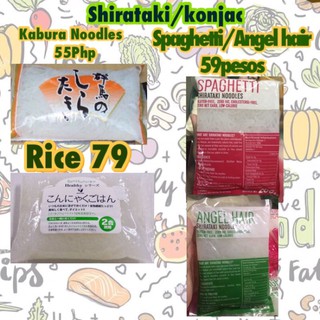Sell ❐◐SHIRATAKI NOODLES/KETO NOODLES best price
0
ratings
₱927
| Ships from | San Nicolas, Metro Manila |
|---|
Product Description
What Are Shirataki Noodles?
Shirataki noodles are long, white noodles. They are often called miracle noodles or konjac noodles.
They’re made from glucomannan, a type of fiber that comes from the root of the konjac plant.
Konjac grows in Japan, China, and Southeast Asia. It contains very few digestible carbs — but most of its carbs come from glucomannan fiber.
“Shirataki” is Japanese for “white waterfall,” which describes the noodles’ translucent appearance. They’re made by mixing glucomannan flour with regular water and a little lime water, which helps the noodles hold their shape.
The mixture is boiled and then shaped into noodles or rice-like pieces.
Shirataki noodles contain a lot of water. In fact, they are about 97% water and 3% glucomannan fiber. They’re also very low in calories and contain no digestible carbs.
A variety called tofu shirataki noodles is very similar to traditional shirataki noodles, but with added tofu that provides a few additional calories and a small number of digestible carbs.
Can Help You Lose Weight
Shirataki noodles can be a powerful weight-loss tool.
Their viscous fiber delays stomach emptying, so you stay full longer and end up eating less (7, 8Trusted Source).
In addition, fermenting fiber into short-chain fatty acids can stimulate the release of a gut hormone that increases feelings of fullness (9Trusted Source).
What’s more, taking glucomannan before consuming a lot of carbs appears to reduce levels of the hunger hormone ghrelin (10Trusted Source).
One review of seven studies found that people who took glucomannan for 4–8 weeks lost 3–5.5 pounds (1.4–2.5 kg) (1Trusted Source).
In one study, people who took glucomannan alone or with other types of fiber lost significantly more weight on a low-calorie diet, compared to the placebo group (11Trusted Source).
In another study, obese people who took glucomannan every day for eight weeks lost 5.5 pounds (2.5 kg) without eating less or changing their exercise habits (12Trusted Source).
However, another eight-week study observed no difference in weight loss between overweight and obese people who took glucomannan and those who did not (13).
Since these studies used 2–4 grams of glucomannan in tablet or supplement form taken with water, shirataki noodles would likely have similar effects.
Nevertheless, there are no studies available on shirataki noodles specifically.
Additionally, timing may play a role. Glucomannan supplements are typically taken up to an hour before a meal, while the noodles are part of a meal.
Compare

SHIRATAKI NOODLES/KETO NOODLES
5
286
ratings
1k
sold
₱55

Shirataki Noodles Keto Vegan Noodles
5
2
ratings
2
sold
₱79

Shirataki Noodles (Keto approved noodles)
0
ratings
₱125

KETO▦▧❒Shirataki Noodles (LOWCARB NOODLES)
0
ratings
₱207

Shirataki Noodles/Keto Noodles/Low-Carb Noodles
4.8
68
ratings
142
sold
₱70

Shirataki Noodles (Keto)
5
8
ratings
21
sold
₱67

Shirataki Noodles - Keto
0
ratings
₱80

KETO SNACK✽∋Shirataki Noodles (LOWCARB NOODLES)
0
ratings
₱249

POWDER❅☎SHIRATAKI NOODLES/KETO NOODLES
0
ratings
₱242

◈۩▩【Genuine article】 SHIRATAKI NOODLES/KETO NOODLES
0
ratings
₱532

SHIRATAKI NOODLES/KETO NOODLES IN STOCK
0
ratings
₱224

noodles◕Shirataki / Keto Noodles 200 grams
0
ratings
₱245

Pasta✿♕SHIRATAKI NOODLES/KETO NOODLES
0
ratings
₱240

【The New】۞◊◑SHIRATAKI NOODLES/KETO NOODLES
0
ratings
₱458

KETO SNACK✿Shirataki Noodles Spaghetti Keto Approved 200g (Shirataki noodles / Shirataki Rice (Mirac
0
ratings
₱241

KETO▩₪SHIRATAKI NOODLES Keto approved
0
ratings
₱209

SHIRATAKI KETO NOODLES 200g
5
414
ratings
2k
sold
₱56

SHIRATAKI NOODLES KETO 200
4.9
824
ratings
6k
sold
₱54

SHIRATAKI NOODLES Keto approved
4.9
680
ratings
2k
sold
₱54

SHIRATAKI noodles keto 200g
3.7
6
ratings
14
sold
₱828

